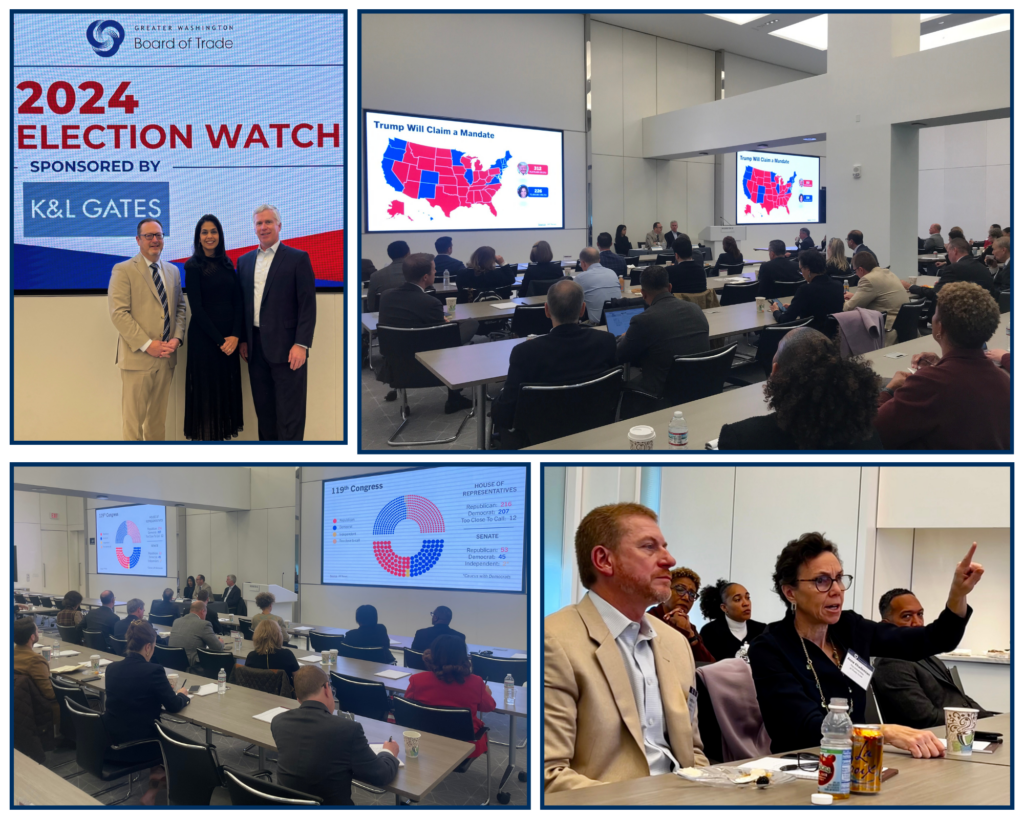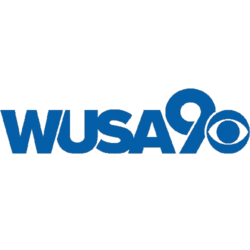Exploring 2024 Election business implications for the Greater Washington region
The Greater Washington Board of Trade and K&L Gates recently hosted the third installment of its 2024 Election Watch series, bringing together regional business leaders, policymakers, and experts to analyze the evolving political landscape and its potential impact on the business community.
This session panel discussion led by Darrell Conner and Karishma Page of K&L Gates, and our President & CEO, Jack McDougle, provided valuable insights into the priorities, challenges, and opportunities presented by a potential second Trump administration, highlighting key issues such as tariffs, federal workforce dynamics, and education policy.
Shifts in Support and Economic Concerns
The discussion opened with a look at demographic support for candidates, noting a trend where higher-income groups leaned toward Vice President Kamala Harris, while other income brackets showed gains for President-elect Trump. The economy remains a pivotal concern for voters and businesses alike, particularly with budget and funding challenges taking center stage.
Audience members shared perspectives on the inflationary impacts of tariffs, a hallmark of Trump’s first term. The panel highlighted the ongoing debate among economists about the long-term effects of these policies, underscoring the complexity of the issue.
Governance and Policy Execution
One of the standout themes was the potential for a shift in governance dynamics. During Trump’s first term, there was frequent uncertainty over whether policy decisions were driven by the White House or federal agencies. The panel suggested we can expect policy to be tightly controlled by the White House, as evidenced by high-profile appointments like Tom Homan as the incoming administration’s border czar.
The panel also explored the vetting and appointment process for cabinet officials, contrasting the more ad hoc approach of 2016 with a potentially more structured strategy for Trump’s second term.

VIEW MORE PHOTOS FROM THIS SERIES
Key Policy Questions
Attendees raised several pressing policy questions for the panel:
- Federal-State Relations: Emphasizing the growing importance of state-level engagement, particularly on issues like K-12 education. Noting some skepticism within Republican communities surrounding federal involvement in education.
- Earmarks: Observing that while earmarks represent a small portion of overall spending, there has been little recent discussion about their future.
- Executive Orders and Regulation: A second Trump administration could likely issue a wave of executive orders on day one, potentially rolling back pending regulations and leveraging the Congressional Review Act to overturn existing policies.
Business Impacts and Workforce Dynamics
The panel spoke about the broader challenges facing businesses, from geopolitical risks and technological advancements to national security concerns. These factors are placing stress on business operations, with potential implications for federal workforce dynamics.
The panel pointed to the recent history of relocating federal agencies, noting that workforce relocation could remain a contentious issue, swinging with changes in administration.
Higher Education, Immigration, and Geopolitics
Panelists expressed uncertainty about future investments in higher education under a new administration. Immigration policy also remains unclear, though Trump’s “America-first” approach suggests a continued focus on legal immigration reform.
Geopolitical risks were another focal point. The panel discussed how these external factors could influence domestic policies, including presidential immunity and governance. Notably, Trump’s circle of allies has expanded since 2016, suggesting a more organized approach to administration planning.
Closing Thoughts
The session concluded with reflections on the long-term trajectory of U.S. governance and its impact on the business community. Panelists emphasized the need for businesses to stay agile and engaged as geopolitical, technological, and policy dynamics continue to evolve.
Thank you to K&L Gates for sponsoring this three part series that engaged our members and business community across the Greater Washington region.
Become a member today
We need your voice at the table to make Greater Washington a place where everyone can succeed



















